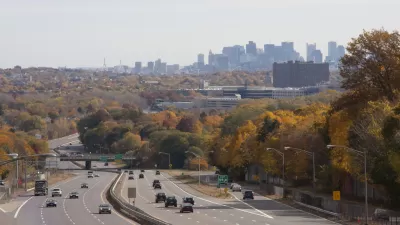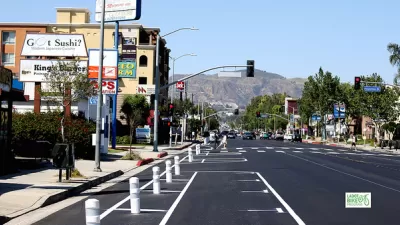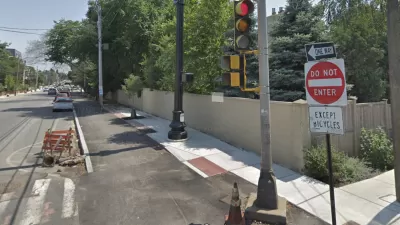The new guidelines call for pedestrian and bike infrastructure as part of the design of new state-run projects.

In an effort to prioritize pedestrians in major transportation projects, a new set of engineering guidelines from the Massachusetts Department of Transportation (MassDOT) "will require traffic engineers to include sidewalks, crosswalks, bus stops, and high-quality bike facilities when they design upgrades for the Commonwealth’s major roadways." As reported by Christian MilNeil for Streetsblog Massachusetts, the new controlling criteria call for "ADA-accessible pedestrian facilities and high-quality bikeways in state-run road reconstruction projects, plus bus shelters, crosswalks, and transit-priority infrastructure on road projects that affect major transit routes."
The policy seeks to act on MassDOT's 2013 Healthy Transportation Policy, which stated that "all MassDOT funded and or designed projects shall seek to increase and encourage more pedestrian, bicycle and transit trips." Under the new guidelines, "engineers can still request exceptions to the criteria when unusual constraints exist. But those exceptions will need to be thoroughly vetted in a public 'Design Justification Workbook,' and they’ll also need to be formally approved by the Secretary of Transportation."
MassDOT Chief Engineer Patricia Leavenworth says projects must still balance effective use of space with funding and local constraints. "It’s kind of like a household budget, where you have your list of things you want but you don’t have all the money you need, so you figure out how to compromise to get the things you really need."
FULL STORY: New ‘Controlling Criteria’ Will Require Sidewalks, Bike Lanes In State Road Projects

Planetizen Federal Action Tracker
A weekly monitor of how Trump’s orders and actions are impacting planners and planning in America.

San Francisco's School District Spent $105M To Build Affordable Housing for Teachers — And That's Just the Beginning
SFUSD joins a growing list of school districts using their land holdings to address housing affordability challenges faced by their own employees.

The Tiny, Adorable $7,000 Car Turning Japan Onto EVs
The single seat Mibot charges from a regular plug as quickly as an iPad, and is about half the price of an average EV.

With Protected Lanes, 460% More People Commute by Bike
For those needing more ammo, more data proving what we already knew is here.

In More Metros Than You’d Think, Suburbs are Now More Expensive Than the City
If you're moving to the burbs to save on square footage, data shows you should think again.

The States Losing Rural Delivery Rooms at an Alarming Pace
In some states, as few as 9% of rural hospitals still deliver babies. As a result, rising pre-term births, no adequate pre-term care and "harrowing" close calls are a growing reality.
Urban Design for Planners 1: Software Tools
This six-course series explores essential urban design concepts using open source software and equips planners with the tools they need to participate fully in the urban design process.
Planning for Universal Design
Learn the tools for implementing Universal Design in planning regulations.
Smith Gee Studio
City of Charlotte
City of Camden Redevelopment Agency
City of Astoria
Transportation Research & Education Center (TREC) at Portland State University
US High Speed Rail Association
City of Camden Redevelopment Agency
Municipality of Princeton (NJ)





























